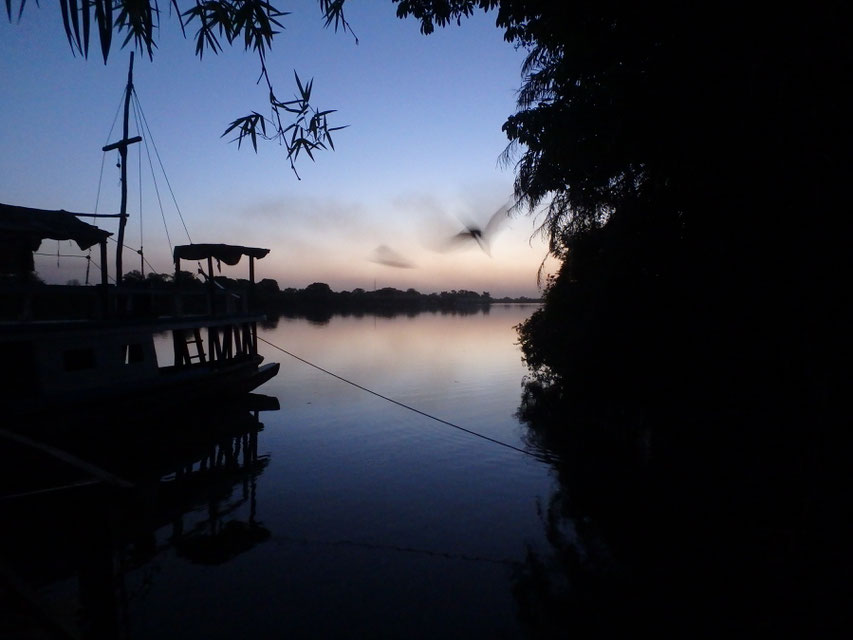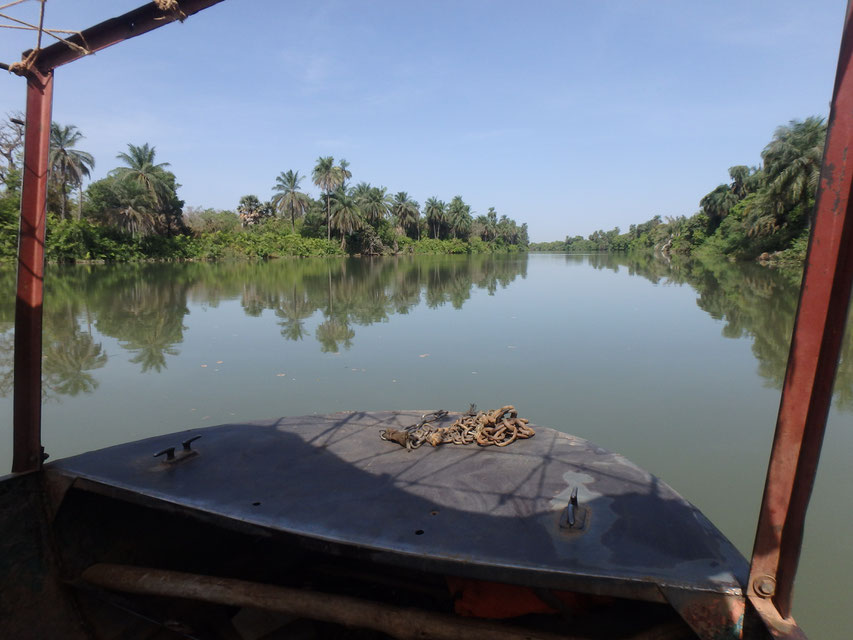
Travel onward from Bwiam was hot and mildly confusing. Initially we caught a big bus to Soma. Out of the window, what limited modernity we had become accustomed to dropped away; roofs changed to thatch and houses shrunk, men began to wear robes more commonly than t-shirts and horse carts soon outnumbered private vehicles. Soma was predominantly a busy intersection, swirling with dust and criss-crossed by semi-panicked donkeys. We went to check the bank for an ATM and were greeted by a nervous, armed security guard, his finger on the trigger, who seemed eager for us to leave. It was much more confusing than threatening. We quickly found a gelly-gelly bound for Janjanbureh.
At any given time, it is rare to be further than thirty centimetres away from a baby on public transport. We provided in-transit entertainment or sometimes accidental terror. Up until that day we had found travel to be quite fun, but the novelty wore off as we waited for the minibus to fill up; trundled off after a bump start (nearly leaving Dan behind); and proceeded to stop what felt like one hundred times, once for as long as an hour, over as many kilometres. To the other passengers dismay (and our confusion) merely a tenth of the journey away from Janjanbureh, we were turfed out of that bus and onto another. Then we waited for that one to fill up. All in all, one hundred and eighty kilometers from Bwiam to Janjanbureh took us seven and a half hours. Dan was getting an increasingly bad back and upon arrival, we accidentally paid one hundred dalasi instead of ten for the five minute ferry crossing across the river Gambia. Finally, we arrived on the north bank dispirited, dirty and on the verge of heat stroke.
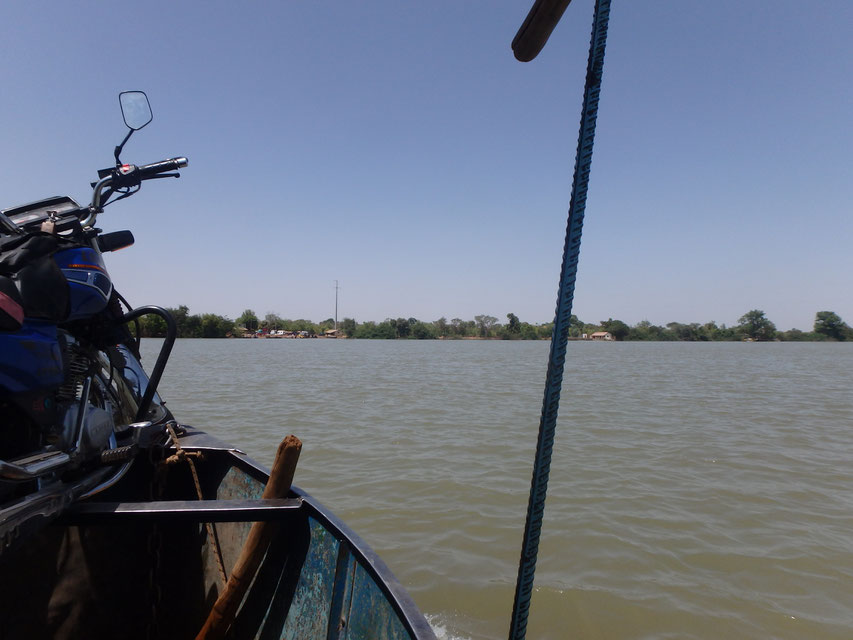
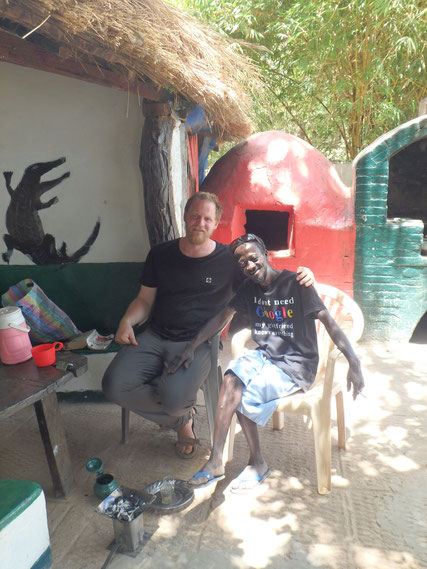
Walking blindly into the dust, I willed Janjanbureh Camp to be open, friendly and have somewhere shady to sit. We were in a sorry state.
Mass, a small accommodating man in his forties, came out to welcome us. He showed us to our room and brought us drinks. Though he doesn't own the place, he was genuinely concerned that we (and the other guests) were comfortable and went far beyond the call of duty to make sure that was the case.
The following day, without any request from us, Mass accompanied us to the clinic to see about Dan's back. After not too much waiting in the spotlessly clean, but badly equipped medical centre, he was prescribed ten tablets of ibuprofen and some "Deep Heat" type muscle relaxant cream. We paid our fifty dalasi and Mass took us off to the pharmacy.
Over the following days, we spent a lot of time talking with Mass and the other staff. They taught Dan to make Attaya (a strong, sticky-sweet green tea) and shared some of their hopes for the future. With his many years of hospitality experience and the ability to cook wonderful meals, Mass will open his own restaurant one day, hopefully somewhere nearer to his family who he missed terribly.
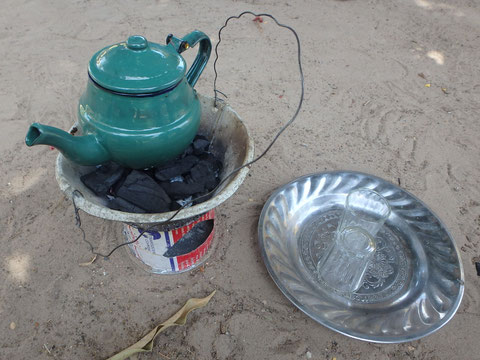
Omar, around my age, told me about his friends who had been killed on "the back way" to Europe. A couple of them had made it as far as Italy, but they couldn't get work or papers. For many young people it is impossible to find a job in Gambia, let alone one with a good enough salary to improve their situation. Very regularly, they don't have enough funds for basic necessities or need to support a poor, reliant family. It is a hard, uncertain existence and they are frustrated. This conversation came up relatively often with various people. Having seen a little of the other side, the ones who made it across the Mediterranean and all the way across Europe, we did our best to highlight the dangers; people already know.
It's beyond uncomfortable to tell people not to come to your home country when they are giving you such a warm welcome in theirs, but after having the conversation a million times before, I'm a little numb. Afterwards I couldn't sleep.

From Janjanbureh, we made a trip further east (thirty miles off as far east as The Gambia reaches) to Basse Santa Su; we needed cash again. Less visited by foreigners, extremely hot and noticeably short on motor vehicles, it felt like the edge of the map. People were friendly and, as opposed to when walking around Janjanbureh, nobody asked for money the whole time we were there. We had a joke with other people waiting for the ATM to be restocked; a lady spilled coffee on my legs and, much to my amusement, rushed to fetch water to drench me in instead (for the sugar).
The bus back to Janjanbureh was so full that one man was crushed up against the concertina door. When he could finally rotate his head, we got talking about the map in our guidebook, the sister he was visiting in hospital and what we were doing in The Gambia. He gave us his contact details in case we came back to Basse and needed somewhere to stay, and just before his stop, hopped off the bus to buy us both cans of cold drink. I felt very far from home.
If you're looking for practical information in advance, I've now written a whole post about what to pack and how to prepare.
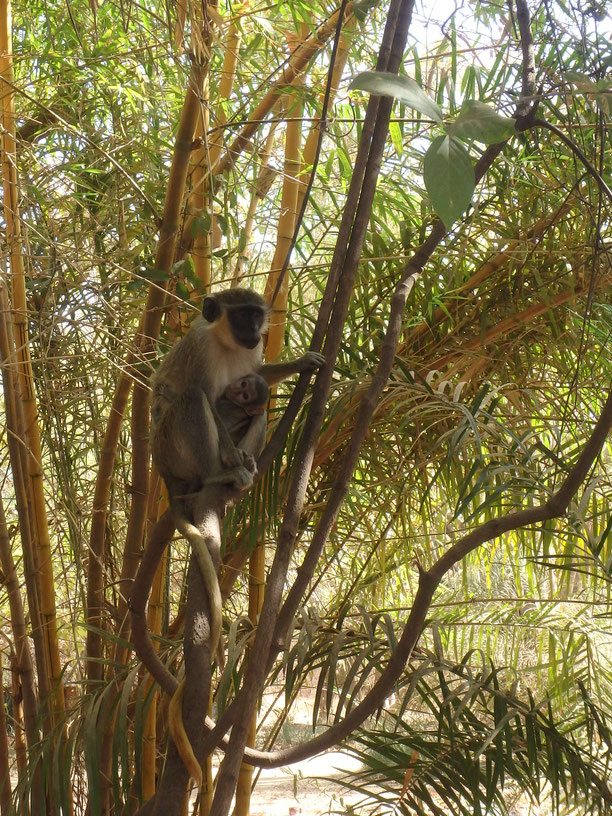
The failed hippo hunt...
Usually on our travels, it's very rare for Dan and I to pay for an excursion, but here the idea of supporting someone's livelihood is appealing. Besides, we love boat trips and wanted to see a hippo.
We did not find a hippo, despite three and a half hours of looking, but we did see two swimming crocodiles, a family or several of Guinea baboons, a new type of red monkey which I'm not sure how to identify, two warthog and a great many birds.



Finally leaving Janjanbureh, we travelled west to Farafenni. The big bus was totally rammed full of people again. Predictably, by the time we arrived, Dan's back was hurting and I was again ready to pass out with a sick, heady feeling something like heat stroke. Eddy's hotel was truly filthy and rather soulless, though you couldn't criticise its central location.
Before we had really processed it, we were travelling to Fass, back in the west, near the border with Senegal and our time in The Gambia was over.
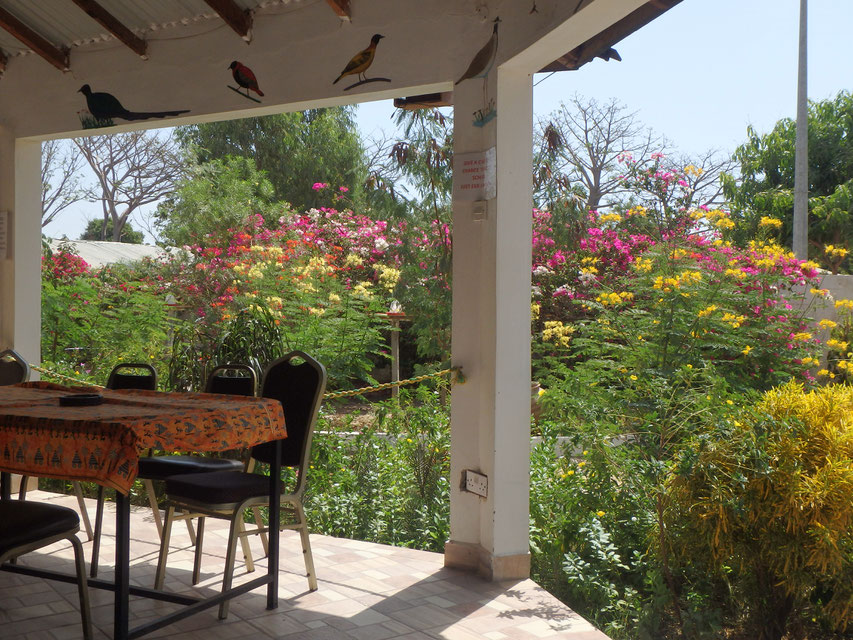
A note about monkeys
Though a novelty for us tourists, Green Monkeys are often a nuisance or even dangerous to local people. They steal food, can destroy property and in other places, have been known to bite people. Some fear of humans is definitely necessary in order to maintain a harmonious relationship, so please do not feed them - they are already too tame in Janjanbureh and the dominant male is becoming aggressive. Eventually, there might be no other option than to shoot them.
If you are bitten by a monkey or other animal in this region, you will need to go to hospital immediately to be checked for rabies. Bansang and Farafenni are the nearest, though it might be worth calling ahead to check if they have the treatment.
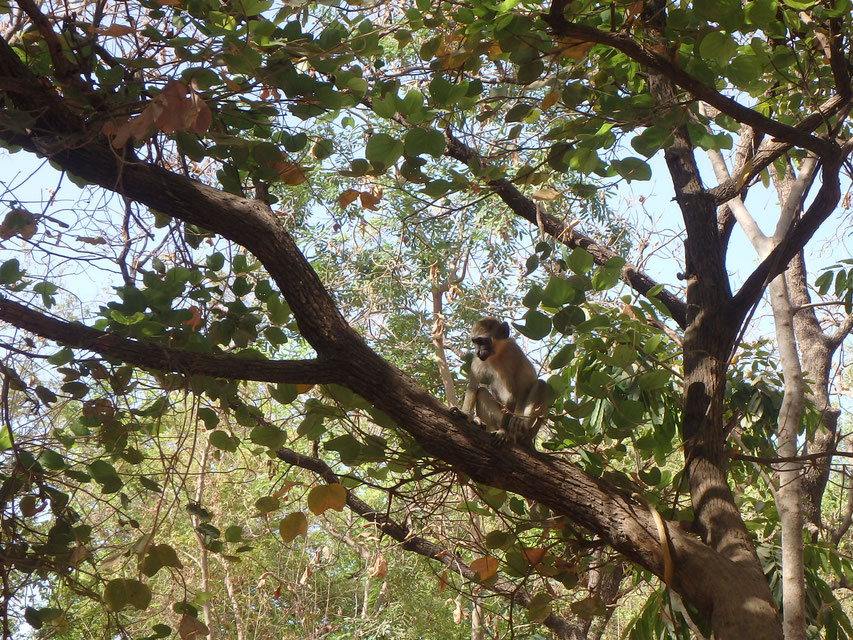
Practical Information
May 2018 - the UK pound is currently worth around 64 Gambian dalasi.
Names for Janjanbureh:
Now officially called Janjanbureh, you will often here the town referred to as Georgetown (the old name) or Makarty (McCarthy Island). Lamin Koto is on the north bank opposite the island.
Transport:
- I previously wrote about public transport from the coast to Bwiam.
- Bus Bwiam to Soma - 75 D per person plus 50 D for our bodyboard bag (1 to 2 hours)
- Gelly-gelly Soma to Janjanbureh - 125 D per person plus 50 D for the bodyboard bag (this might have been quite inflated as there was some argument about how much we should be charged)
- Bus Janjanbureh to Basse Santa Sue - 50 D per person (1 to 2 hours)
- 8am Bus Janjanbureh to Farrafenni - 75 D each plus 10 D for the bag (around 3 hours)
- Gelly-gelly Farrafenni to Barra - 90 D each (1 hour 20 minutes)
- Gelly-gelly Barra to Fass - 30 D each plus 15 D for the bag (around 30 minutes)
Accommodation:
- Bwiam - see my previous post for very cheap, good accommodation.
- Janjanbureh Camp - 1400 D for an en-suit double room, breakfast and dinner for two people. Lunch is 150 D per person extra.
- Farrafenni - Eddy's Hotel 600 D for an en-suit double room. It was relatively secure and the staff were not unfriendly, but it needed a serious deep clean.
- Fass - Helping Lodge - 800 D each (a bit expensive for us, but the profits are going to Helping Charity which helps disadvantaged children around the area). Reflecting the price, this accommodation was far cleaner and much more luxurious than anywhere else we have stayed. It has mains electricity, a fan, wifi and a large en-suit. Meals were 250 D each.
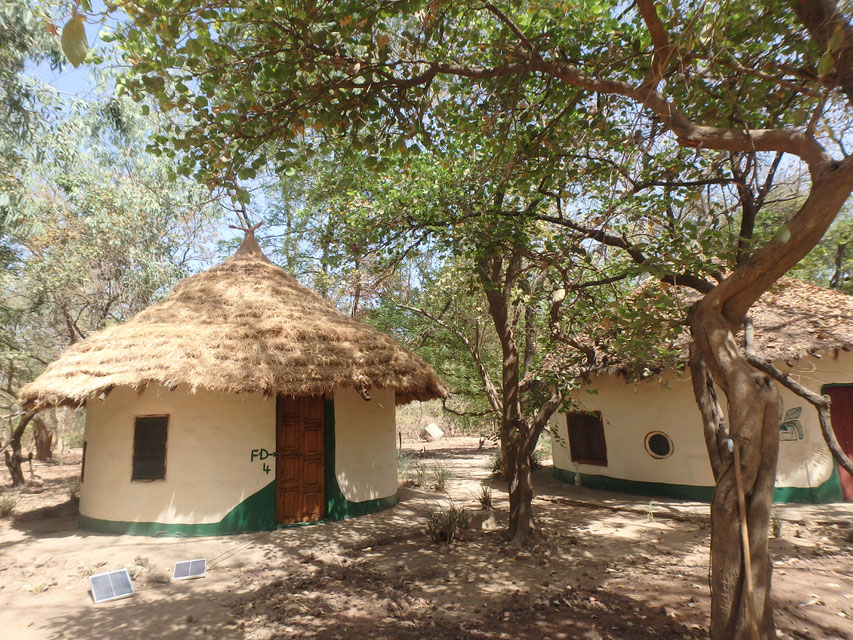
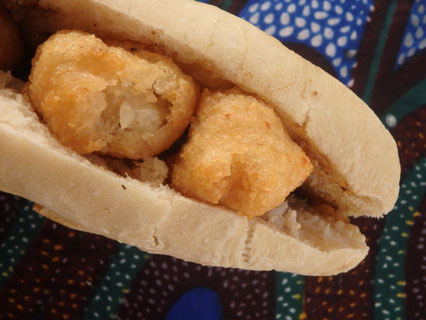
Food:
In low-key, local restaurants or at our accommodation, whatever we are given to eat is nearly always too much for me to finish. I don't have a bird appetite by any means, but I feel like people are worried we won't have enough and over-compensate. As Dan is already stuffed without my left-overs and I don't want to waste anything, I have begun asking "Not too much for me please. All this good food is making me very fat. haha!" or something similar in advance. I'm not really sure of the correct cultural etiquette, but this usually receives a laugh.
As I mentioned previously, I have completely failed to be vegetarian in The Gambia. If you were to ask, I am sure people would oblige and cook you something special in guesthouses and restaurants, but we have rarely been given a menu and I've been happy to accept whatever I was given.
These are some good, vegetarian street food options we found:
To the right is Akara in tapalapa bread (it was about five times bigger than this, but I was hungry). It’s made from black-eyed peas, ground into flour, deep-fried and served in a spicy onion sauce. It's hard to know if the vendors are worth mentioning as their businesses are so portable, but we found the following:
- Janjanbureh - just south of the bus stop/police station, to the right hand side, on the same road.
- Fass - on the main road, about 50m away from Helping Lodge
Nyebbeh is a bean mash that comes with an oily sauce in more tapalapa bread.
- Farrafenni - between Eddies Hotel and the roundabout in the centre of town.
Pancakies(?! - please correct me on this). These are small dough balls deep fried - best straight from the boiling vat, but also sold widely in packs of around 6 for 5 D through the windows of busses and similar.
Omelette and tapalapa - a breakfast food. We found a great stall run by an old man, selling onion omelettes and coffee with condensed milk or tea in Farafenni, just next to the roundabout.
Mangos, mangos, mangos... This (May) is the start of the mango season and it seems to last in several swathes until about September depending on the variety/location. Bring a small knife and possibly something to clean your hands and you can stuff your face with these all day long.
Manners:
I am only just learning this myself, but I struggled to find much information online before we came. Please email me with corrections or any relevant link written by a Gambian or more experienced expert.
Never launch into conversation or questions without greeting someone first:
- Salaam Alaikum means 'May Peace Be upon you'. The response is Alaikum Salaam - 'May Peace Be upon you too'.
- Usually, if you don't know which tribe a person is from or the appropriate greeting in their language, this is followed by "Good Morning" (sometimes in the afternoon), though "Good Afternoon" would also be nice.
- Then, "How are you?" - "Fine, thank-you" and repeated in the other direction.
- In many cases this is enough, but within your accommodation it seems polite to ask "How did you sleep?" first thing. Probably this is usually only directed at guests, but I often return "and you?" just to be sure.
- Wolof people particularly seem to follow with questions about the health of your family.
If you are staying in one place for any amount of time, it would be polite and appreciated to learn the basic greetings of the predominant language. I haven't got very far with this as (I have been baffled/lazy and) whatever small thing I learn seems to be inapplicable with the next person I talk to. With some attention and effort, you would definitely get better at this over time.
Dress code:
Generally, the further east you travel, the less used to tourists people become. To be on the safe side of conservative (and avoid sunburn), I have been wearing either a thin, full length skirt or loose cotton trousers. I don't wear anything more revealing than a t-shirt on top, but am usually in a shirt (as seen above) or long(ish), tunic type top. In some situations this is over-kill, but most other times women are covered from ankle to elbow. Muslim women usually cover their hair, but it is not necessary to do so as a foreigner and as a compromise, I tie my hair back to keep it out of the way. Dan wears light, full length trousers and a t-shirt or one of the shirts he has had made. Knee-length shorts do not appear to be offensive, but are rarely seen on adult men.
See the bottom of my previous post for information about money and asking directions.
